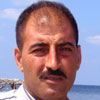Claims of 14 deaths in previous incidentsBy Billy Briggs
A SCOTTISH human rights activist has filmed the Israeli navy firing machine guns at unarmed Palestinian fishing boats in the Mediterranean Sea off the coast of the Gaza Strip.
The footage, taken on September 6 by Andrew Muncie, who is from the Highlands, shows an Israeli gunboat engaging fishing boats while international observers hold their arms in the air and scream for them to stop firing.
No-one was injured in the incident, but Palestinian fishermen claim 14 colleagues have been murdered at sea by the Israeli navy since the onset of an economic blockade imposed after Hamas took control of the Gaza Strip in June 2007. Israel says patrolling these waters is a vital security measure to stop weapons being smuggled into Gaza.
Muncie, 34, of Dalbreagha, Spean Bridge, is working with the Free Gaza movement and arrived in Gaza last month as part of a group of 40 activists who sailed on two boats from Cyprus in an attempt to breach Israel's blockade. He was accompanied by an 81-year-old nun, an 84-year-old holocaust survivor and Cherie Blair's sister, Lauren Booth.
Most of the activists have since returned to Cyprus, but Muncie and eight others opted to stay on and assist local people, including fishermen.
He said the incident with the Israeli navy took place four miles out to sea at 9.30am. "We had barely left Gaza's coastline behind when the gunboat's heavy machine gun opened up, spraying the wake around our hull with bullets. I've been out with the fishermen on several occasions and seen them the Israeli navy also use explosive shells fired from a cannon, and explosive charges flung into the water near a boat," he said.
Muncie claimed that in a separate incident on September 3, two fishermen were hospitalised and another fishing boat had been rammed and badly damaged in a separate incident last week.
Muncie's mother, Margaret, said: "You feel horror first of all seeing the video because you are seeing images of unarmed people being viciously attacked by military might; anger because there is no justification ever for this kind of action, and because it is illegal as well as immoral. Then terror for your own son's safety, and his friends, and for the brave fishermen who have to face this situation every day.
"And in that mixture of emotions, there is great pride that our Andrew is risking his own safety to defend the rights of others. And I know that John, my husband, feels the same as me, as do our other sons, David and Christopher."
Last month, the Sunday Herald reported claims by Gaza fishermen that they had been attacked at sea.
The Gaza Strip's waters have been patrolled by the Israeli navy since a blockade was imposed after Hamas took control of the Strip. Israel allows in limited supplies of food, fuel and aid but last year tightened economic sanctions in response to rocket attacks by militants on Israeli towns near Gaza.
According to the United Nations, the crisis has left the number of households in Gaza below the poverty line at an unprecedented 52%.
Gaza's fishing industry has been hit particularly hard. Under the 1993 Oslo accords, Gazan fishermen were to be allowed 20 nautical miles out to sea. According to Oxfam, fishermen are now only allowed six miles out to sea - not far enough out to reach the schools of large fish - and risk being shot or arrested if they breach this limit.
The Israeli Embassy in London declined to comment on Muncie's film.







